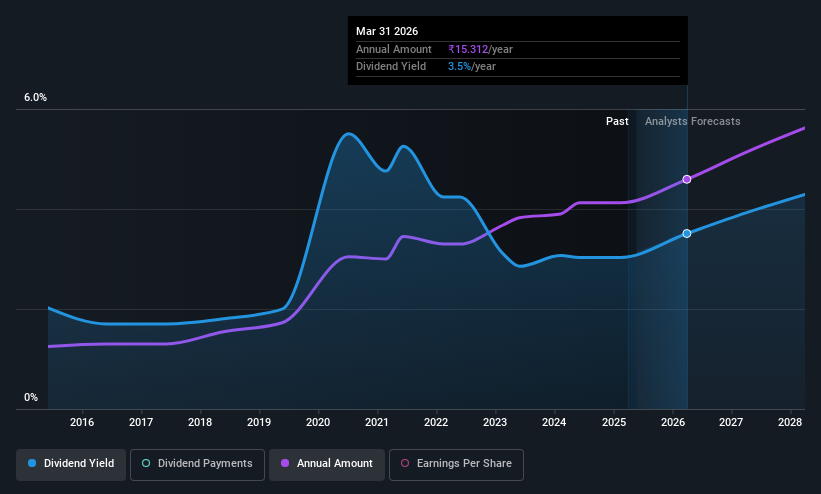Dividend Investors: Don't Be Too Quick To Buy ITC Limited (NSE:ITC) For Its Upcoming Dividend
Regular readers will know that we love our dividends at Simply Wall St, which is why it's exciting to see ITC Limited (NSE:ITC) is about to trade ex-dividend in the next two days. The ex-dividend date is two business days before a company's record date in most cases, which is the date on which the company determines which shareholders are entitled to receive a dividend. It is important to be aware of the ex-dividend date because any trade on the stock needs to have been settled on or before the record date. Meaning, you will need to purchase ITC's shares before the 28th of May to receive the dividend, which will be paid on the 31st of July.
The company's next dividend payment will be ₹7.85 per share, on the back of last year when the company paid a total of ₹14.35 to shareholders. Last year's total dividend payments show that ITC has a trailing yield of 3.3% on the current share price of ₹436.30. If you buy this business for its dividend, you should have an idea of whether ITC's dividend is reliable and sustainable. So we need to check whether the dividend payments are covered, and if earnings are growing.
We've discovered 1 warning sign about ITC. View them for free.Dividends are typically paid out of company income, so if a company pays out more than it earned, its dividend is usually at a higher risk of being cut. Last year ITC paid out 91% of its profits as dividends to shareholders, suggesting the dividend is not well covered by earnings. A useful secondary check can be to evaluate whether ITC generated enough free cash flow to afford its dividend. Over the past year it paid out 116% of its free cash flow as dividends, which is uncomfortably high. It's hard to consistently pay out more cash than you generate without either borrowing or using company cash, so we'd wonder how the company justifies this payout level.
As ITC's dividend was not well covered by either earnings or cash flow, we would be concerned that this dividend could be at risk over the long term.
Check out our latest analysis for ITC
Click here to see the company's payout ratio, plus analyst estimates of its future dividends.

Have Earnings And Dividends Been Growing?
Stocks in companies that generate sustainable earnings growth often make the best dividend prospects, as it is easier to lift the dividend when earnings are rising. If earnings fall far enough, the company could be forced to cut its dividend. With that in mind, we're encouraged by the steady growth at ITC, with earnings per share up 4.8% on average over the last five years. Minimal earnings growth, combined with concerningly high payout ratios suggests that ITC is unlikely to grow the dividend much in future, and indeed the payment could be vulnerable to a cut.
Many investors will assess a company's dividend performance by evaluating how much the dividend payments have changed over time. ITC has delivered an average of 13% per year annual increase in its dividend, based on the past 10 years of dividend payments. It's encouraging to see the company lifting dividends while earnings are growing, suggesting at least some corporate interest in rewarding shareholders.
To Sum It Up
Should investors buy ITC for the upcoming dividend? The dividends are not well covered by either income or free cash flow, although at least earnings per share are slowly increasing. With the way things are shaping up from a dividend perspective, we'd be inclined to steer clear of ITC.
With that in mind though, if the poor dividend characteristics of ITC don't faze you, it's worth being mindful of the risks involved with this business. In terms of investment risks, we've identified 1 warning sign with ITC and understanding them should be part of your investment process.
If you're in the market for strong dividend payers, we recommend checking our selection of top dividend stocks.
Have feedback on this article? Concerned about the content? Get in touch with us directly. Alternatively, email editorial-team (at) simplywallst.com.
This article by Simply Wall St is general in nature. We provide commentary based on historical data and analyst forecasts only using an unbiased methodology and our articles are not intended to be financial advice. It does not constitute a recommendation to buy or sell any stock, and does not take account of your objectives, or your financial situation. We aim to bring you long-term focused analysis driven by fundamental data. Note that our analysis may not factor in the latest price-sensitive company announcements or qualitative material. Simply Wall St has no position in any stocks mentioned.
 Wall Street Journal
Wall Street Journal